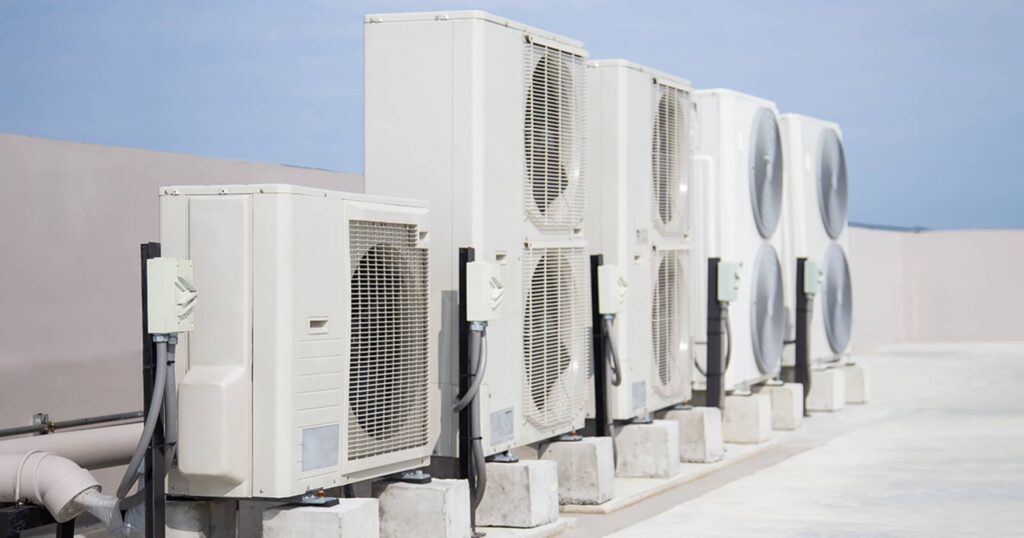
Your home’s heating, ventilation, and air conditioning (HVAC) system is responsible for providing a comfortable indoor environment year-round. In the summer, it keeps your home cool and reduces humidity levels. In the winter, it keeps your home warm and prevents excessive moisture from causing condensation and mould growth.
HVAC systems typically consist of three main components: a furnace or heat pump to generate heat, a central air conditioner to remove heat, and a duct system to distribute conditioned air throughout the home. Some systems also include an evaporator coil, which helps to further remove heat and humidity from the air. By understanding how your HVAC system works, you can take steps to ensure that it runs efficiently and effectively for years to come.
Central air conditioning is one of the most popular types of HVAC systems. It consists of an outdoor unit that houses the compressor and condenser, and an indoor unit that contains the evaporator coils. A fan circulates refrigerant between the two units, and a duct system distributes cool air throughout the home. Central air conditioning is an efficient way to cool a large space, and it can be used in conjunction with other heating and cooling systems. However, it is important to note that central air conditioning requires regular maintenance in order to keep it running smoothly.
A split-system air conditioner is the most common type of AC system found in homes. This system has an indoor unit that houses the evaporator coil and a blower fan, as well as an outdoor unit that contains the condenser coil and compressor. The two units are linked by refrigerant lines.
When the AC is turned on, the indoor unit pulls warm air from the home over the evaporator coil. The refrigerant inside the coil absorbs the heat from the air, cooling it down. The cooled air is then blown back into the room. At the same time, the outdoor unit pumps refrigerant through the condenser coil, where it releases its heat to the outside air. This process continues until the desired temperature is reached. Split-system ACs are available in a variety of configurations, including ductless mini-splits, which do not require ductwork. They are also available in different sizes to accommodate different-sized homes.
A packaged terminal air conditioner (PTAC) is a self-contained heating and cooling unit typically used in hotels, offices, senior housing facilities, and hospitals. PTACs are available in a variety of sizes and capacities to meet the specific needs of the space they will be installed in. PTAC units are typically installed through an exterior wall and have their own thermostat to control the temperature.
One advantage of PTAC units is that they can be used in both heating and cooling mode, providing year-round comfort for occupants. Another advantage is that PTACs are typically very quiet, making them ideal for use in spaces where noise levels must be kept to a minimum. However, one downside of PTACs is that they can be expensive to operate due to their high energy consumption.
Geothermal heat pumps are one of the most efficient types of HVAC systems. They work by extracting heat from the ground or groundwater and using it to heat a building. In the winter, the system reverses the process, drawing heat from the building and pumping it back into the ground. Geothermal heat pumps can be used in both residential and commercial applications.
One advantage of geothermal heat pumps is that they are not affected by the outside temperature, making them a very efficient choice in colder climates. Additionally, they have a long lifespan and require very little maintenance. However, geothermal heat pumps can be expensive to install, and they require a large amount of land for underground piping. As a result, they are not always the best choice for smaller properties.
In conclusion, there are four main types of HVAC systems: air conditioners, furnaces, heat pumps, and geothermal heat pumps. Each type has its own advantages and disadvantages, so it is important to choose the right system for your specific needs. If you are not sure which system is best for you, consult with a professional HVAC contractor to get expert advice.
At Digital Estimating, we provide high-quality HVAC estimation services to our clients. We have a team of experienced and certified cost estimators who are available 24/7 to help you with any HVAC estimation needs you may have.
Scam Alert: Verify All communication with Digital Estimating LLC by Calling us at 281-899-0989 before responding to suspicious emails and invoices.

Digital Estimating is a team of leading-class professionals for construction estimating services. We can deliver quality estimates to help you win bids for public/open shop, residential, and commercial projects.